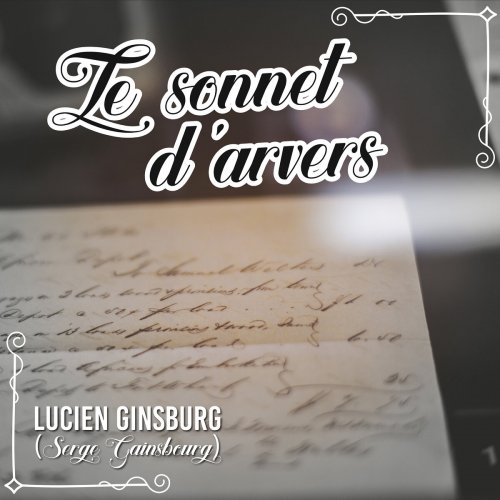
Lucien Ginsburg (Serge Gainsbourg) - Le Sonnet D'Arvers (2020)
BAND/ARTIST: Lucien Ginsburg (Serge Gainsbourg)
- Title: Le Sonnet D'Arvers
- Year Of Release: 2020
- Label: Play Music
- Genre: French Pop, Baroque Pop
- Quality: Flac (tracks)
- Total Time: 38:57
- Total Size: 220 Mb
- WebSite: Album Preview
Tracklist:
01. Hold Up
02. Qui Est in Qui Est Out
03. Intoxicated Man
04. No No Thank's No
05. Judith
06. Docteur Jekyll and Mister Hyde
07. Black and White
08. Initials B.B.
09. Le Sonnet D'Arvers
10. Le Talkie-Walkie
11. Requiem Pour Un Twister
12. La Fille Au Rasoir
13. Quand Mon 6.35 Me Fait Les Yeux Doux
14. Maxim'S
15. Chatterton
16. Marabout
17. Ford Mustang
01. Hold Up
02. Qui Est in Qui Est Out
03. Intoxicated Man
04. No No Thank's No
05. Judith
06. Docteur Jekyll and Mister Hyde
07. Black and White
08. Initials B.B.
09. Le Sonnet D'Arvers
10. Le Talkie-Walkie
11. Requiem Pour Un Twister
12. La Fille Au Rasoir
13. Quand Mon 6.35 Me Fait Les Yeux Doux
14. Maxim'S
15. Chatterton
16. Marabout
17. Ford Mustang
(April 2, 1928 – March 2, 1991) Poet, singer-songwriter, painter, actor and director. Born in Paris, France, the son of Jewish Russian parents. He had well known children : a daughter, Charlotte, with Jane Birkin; and a son, Lucien Gainsbourg (aka Lulu), with his last partner, Bambou. Two other children are non-mediatics : Natacha (born 8 August 1964) and Paul (born 13 April 1968) with Françoise Antoinette Pancrazzi.
Serge Gainsbourg (born Lucien Ginsburg), wanted to be a painter but earned his living as a piano player in bars. He was tapped to join the cast of the musical 'Milord L'Arsouille', where he reluctantly assumed a singing role; self-conscious about his rather homely appearance, Gainsbourg initially wanted only to carve out a niche as a composer and producer, never as a performer.
His early influence was Boris Vian. Gainsbourg wanted to free himself from what he considered old-fashioned 'chanson' and explore other musical grounds, influenced especially by British and American pop. He also wrote soundtracks for more than 40 movies and directed himself in four movies: 'Je t'aime... moi non plus' (10 years censored*), 'Equateur', 'Charlotte For Ever' and 'Stan The Flasher'.
* Je T'aime ... Moi Non Plus (1969) the song, featured simulated sounds of female orgasm. Originally recorded with Brigitte Bardot, it was instead released with a future girlfriend Jane Birkin as Brigitte Bardot backed out. The song was censored in many countries and in France even the toned-down version was suppressed. The Vatican made a public statement citing the song as offensive. Its notoriety led to it reaching no. 1 in the UK chart.
A frequent interpreter of Gainsbourg's songs was British torch singer Petula Clark, whose success in France was propelled by her recordings of his tunes but the first English-language version of a Gainsbourg song was Dionne Warwick's 1965 version of 'Mamadou'.
Concept album Histoire De Melody Nelson produced and arranged by Jean-Claude Vannier was somewhat based on Nabokov's novel Lolita. It has proven influential with artists such as AIR, David Holmes who covered a track and Beck.
in 1978 with Robbie Shakespeare, Sly Dunbar and Rita Marley he made a Reggae version of the French national anthem "La Marseillaise". His version earned him death threats from right wing veterans of the Algerian War of Independence (OAS). Gainsbourg was able to reply to his critics that his version was in fact closer to the original as the manuscript clearly shows the words "Aux armes et cætera..." for the chorus.
Serge Gainsbourg (born Lucien Ginsburg), wanted to be a painter but earned his living as a piano player in bars. He was tapped to join the cast of the musical 'Milord L'Arsouille', where he reluctantly assumed a singing role; self-conscious about his rather homely appearance, Gainsbourg initially wanted only to carve out a niche as a composer and producer, never as a performer.
His early influence was Boris Vian. Gainsbourg wanted to free himself from what he considered old-fashioned 'chanson' and explore other musical grounds, influenced especially by British and American pop. He also wrote soundtracks for more than 40 movies and directed himself in four movies: 'Je t'aime... moi non plus' (10 years censored*), 'Equateur', 'Charlotte For Ever' and 'Stan The Flasher'.
* Je T'aime ... Moi Non Plus (1969) the song, featured simulated sounds of female orgasm. Originally recorded with Brigitte Bardot, it was instead released with a future girlfriend Jane Birkin as Brigitte Bardot backed out. The song was censored in many countries and in France even the toned-down version was suppressed. The Vatican made a public statement citing the song as offensive. Its notoriety led to it reaching no. 1 in the UK chart.
A frequent interpreter of Gainsbourg's songs was British torch singer Petula Clark, whose success in France was propelled by her recordings of his tunes but the first English-language version of a Gainsbourg song was Dionne Warwick's 1965 version of 'Mamadou'.
Concept album Histoire De Melody Nelson produced and arranged by Jean-Claude Vannier was somewhat based on Nabokov's novel Lolita. It has proven influential with artists such as AIR, David Holmes who covered a track and Beck.
in 1978 with Robbie Shakespeare, Sly Dunbar and Rita Marley he made a Reggae version of the French national anthem "La Marseillaise". His version earned him death threats from right wing veterans of the Algerian War of Independence (OAS). Gainsbourg was able to reply to his critics that his version was in fact closer to the original as the manuscript clearly shows the words "Aux armes et cætera..." for the chorus.
Pop | Musique Française | FLAC / APE | Mp3
As a ISRA.CLOUD's PREMIUM member you will have the following benefits:
- Unlimited high speed downloads
- Download directly without waiting time
- Unlimited parallel downloads
- Support for download accelerators
- No advertising
- Resume broken downloads


